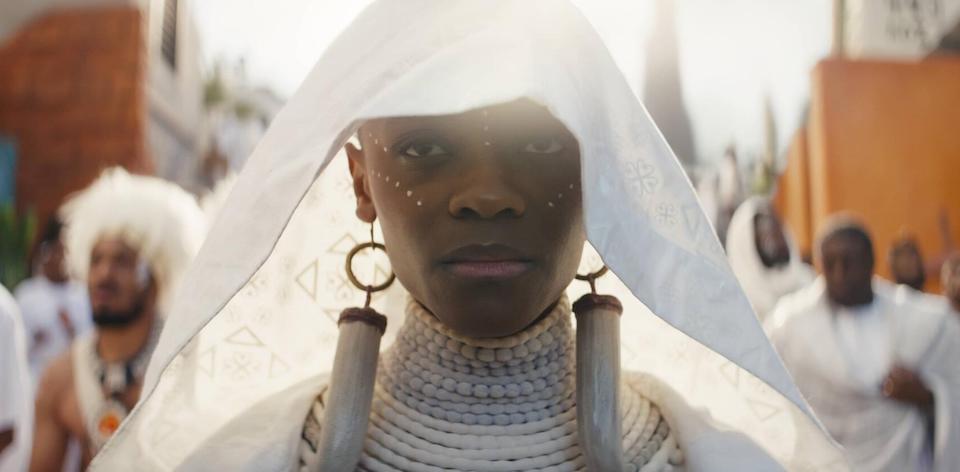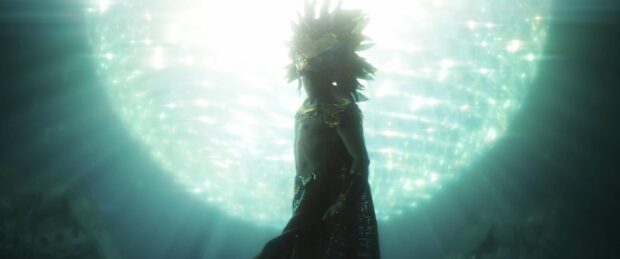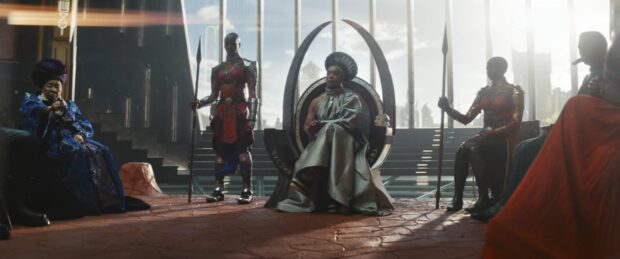The sequel to Black Panther certainly had some odds stacked against it. As the final theatrical film in Phase Four of the Marvel Cinematic Universe, it is ostensibly a conclusion, or at least coda, to the disparate threads of the last two years. It was also faced with acknowledging the tragic death of its star Chadwick Boseman at the end of 2020.
Which is where BLACK PANTHER: WAKANDA FOREVER begins, as T’Challa’s genius sister Shuri (Letitia Wright) valiantly struggles to save the Black Panther from a mystery illness. Unable to rescue him, Wakanda enters a period of national mourning, brilliantly realised by returning director Ryan Coogler in a Wakandan dance ceremony that sets the tone for the film.
As the world learns of T’Challa’s passing, stoic queen Ramonda (Angela Bassett) stops at nothing to defend the nation from foreigners seeking to challenge Wakanda. A US task force, using the technology of young college prodigy Riri Williams (Dominique Thorne), finds an underwater source of the rare vibranium metal — but with unexpected consequences.
The surface world earns the ire of the hitherto unseen Talokan people, an underwater civilisation led by the mighty Namor (Tenoch Huerta Mejía). When Talokans kidnap Riri and attack Wakanda, the two nations are on the brink of war. Shuri must decide to embrace her brother’s legacy or allow herself to be consumed by vengeance.
In WAKANDA FOREVER, the cast is king. In the void left by Boseman, the rest of the characters step up to highlight the world of Wakanda. Bassett is unquestionably the MVP, finding a balance between mourning and fiercely ruling. Winston Duke has a larger role to the delight of everyone, and it’s great to see the return of Lupita Nyong’o. As the anti-hero, Tenoch Huerta Mejía is the find of the century, stepping effortlessly into a new take on one of Marvel’s earliest characters. Only Wright seems a little unsure of the direction for her character, although having the mantle suddenly thrust upon her seems appropriate.
Indeed, there’s a lot going on for our heroes — and some of it gets lost in the mix. The expanded look at Wakanda is wonderful, with Coogler finding a good combination of African-inspired motifs, Afro-Futurist technology, and everyday life. Twinned with the Mayan influence and Yucatec Maya languages of the submariner’s Talokan, there’s a firm sense of place when the story sticks to this simple dichotomy.
Yet the film loses focus the second it steps away from these worlds. As CIA Agent Everett K. Ross (Martin Freeman) desperately tries to misdirect US authorities in order to aid the Wakandans, director Valentina Allegra de Fontaine (Julia Louis-Dreyfus) has her own agenda for control. The inevitability of Riri building her own suit is telegraphed from the start, and frankly cool to see on-screen, but one wonders if it adds anything to this story. There’s so much going on, it may have worked better as a series.
Of course, these are the set-ups for the Disney+ series and other films. After all, the seeds are planted here for the Ironheart and as-yet-untitled Wakanda series, along with the theatrical releases of Armor Wars and Thunderbolts. Indeed, this has been par for the course with Phase Four releases, many of which have focused on next steps rather than the task at hand. Thankfully, Coogler’s character-based drama is a little more grounded than this.
Which is probably why Marvel chose to not end WAKANDA FOREVER with a glimpse of the future, as they’d already given us plenty of hints of what was coming. There’s a mid-credits coda that’s largely been seen as a tribute to Boseman, but it’s also one that allows some space for the emotion of the moment. It allows the cast and audience to come full circle on the mourning period for both the actor and the character.
On a technical level, WAKANDA FOREVER is a mixed bag. Ludwig Göransson’s stirring score is mixed with a banging soundtrack that mixes the likes of Rihanna with terrific tunes from South Africa, Mexico and Nigeria. As one would expect, the special effects are top-notch, and the climactic battles are immersive and gripping. Yet there’s also the Marvel tradition of some fairly ordinary photography in between, perhaps showing cinematographer Autumn Durald Arkapaw’s limited experience with blockbusters. (There are also some shots that I swear were out of focus, but I am willing to blame this on the cinema projection).
On one hand, BLACK PANTHER: WAKANDA FOREVER is the kind of film that Phase Four has needed all along. It contains familiar characters, an expansion of an existing world, while introducing a major character for the future of the franchise. Yet, like Shuri taking on the Black Panther mantle, it is still finding its feet. It will be interesting to see where this timeline branches off to next.
2022 | USA | DIRECTOR: Ryan Coogler | WRITERS: Ryan Coogler, Joe Robert Cole | CAST: Letitia Wright, Lupita Nyong’o, Danai Gurira, Winston Duke, Florence Kasumba, Dominique Thorne, Michaela Coel, Tenoch Huerta Mejía, Martin Freeman, Julia Louis-Dreyfus, Angela Bassett | DISTRIBUTOR: Disney | RUNNING TIME: 161 minutes | RELEASE DATE: 10 November 2022 (AUS), 11 November 2022 (USA)








